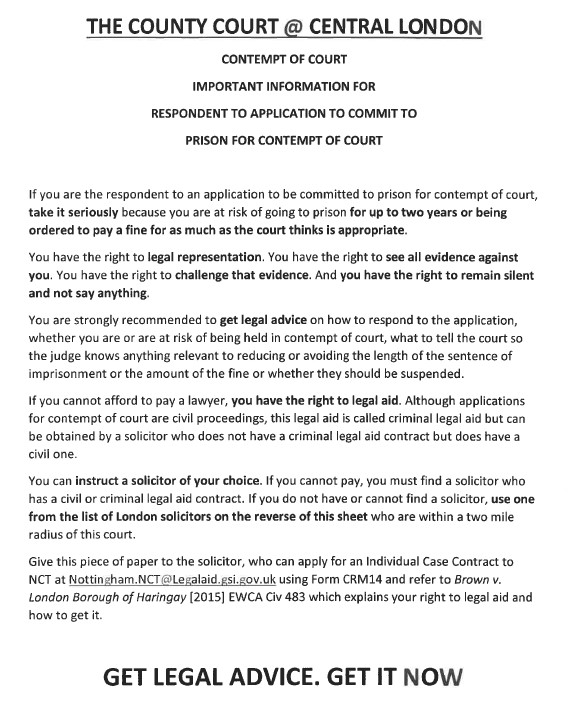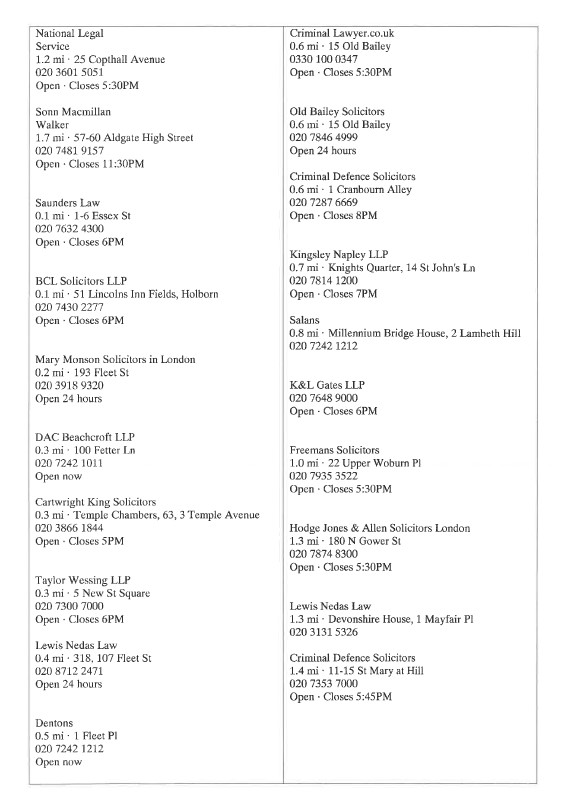Committal proceedings and legal aid
- Details
 Elizabeth England discusses an important Court of Appeal case on sentencing for contempt of court where issues are raised in respect of legal aid.
Elizabeth England discusses an important Court of Appeal case on sentencing for contempt of court where issues are raised in respect of legal aid.
In Naomi James v Hannah James [2018] EWCA Civ 1982 the Court of Appeal has handed down additional guidance on the requirement to give a defendant in committal proceedings a notice of the availability of legal aid. Judges will now be reluctant to make any order sentencing a defendant in the absence of such a notice, and decisions made without such a notice having been given may be vulnerable to appeal.
The facts
In 2016, Mr James died intestate. He had two daughters who were the parties to the claim. The estate comprised a modest £100 in a bank account, together with two private pensions totalling £75,787.00. In relation to first pension, the sisters applied jointly for distribution of the benefit and this was indeed fairly distributed between them. The second pension was an NHS pension which only allowed for one person to receive the benefit. The sisters agreed that one of them would receive the pension benefit and distribute that sum equally between them.
In July 2017, Naomi James was granted letters of administration. On 31 October 2017, Naomi James told her sister that she would not be claiming the NHS pension. In March 2018 following enquiries made by Hannah James, the NHS confirmed that the entire pension had been paid out to Naomi James in November 2017. Hannah James sued Naomi James for 50% of the benefit of the NHS pension.
In the process of litigation, Naomi James refused to give disclosure of the documents relevant to the claim. At a hearing, she indicated to the Judge that she had all of the documents in a plastic bag with her in court. She then refused to allow the other side to see them. Hannah James applied for an injunction to compel disclosure, and following breach of that order, for Naomi James’ committal to prison for breach of that order.
The claimant's solicitors wrote to Naomi James in terms that:
"You may wish to seek legal advice on the contents of this letter and the enclosed documents. Legal aid is available and you should contact the Legal Aid Agency if you wish to avail yourself of this opportunity."
Lord Justice Bean, giving judgment, was persuaded by the words of McCombe LJ in the case of Haringey London Borough Council v Brown [2017] 1 WLR 542;
“46. At least until some improvement is made to the drafting of the legislation…it seems to me that it is important that all involved in committal proceedings in the County Courts should be aware of the route to be taken in applying for legal aid in such proceedings. For my part, I would encourage the LAA, the Courts Service, the judiciary, the professions and the voluntary organisations (that assist litigants) to co-operate in ensuring at an early stage in committal proceedings that all concerned are aware of the authority to which legal aid applications in such cases are to be made and what the entitlements are. It may be that, as Mr Bridge submitted here, consideration should be given to the promulgation of standard directions on the subject, either on the application notice itself and/or in any preliminary order regulating the procedure in an individual case."
Bean LJ said;
“I would echo that. It would surely not be rocket science for a court centre such as Central London County Court to have a standard handout to be given to contemnors in Ms James' position, not simply saying: "You have a right to legal aid" but giving practical assistance about how and to whom an urgent application should be made.
…
I do not consider that this appellant should have been the subject of an order for committal, as opposed to the issue of a bench warrant if she failed to attend court, until she had had a proper opportunity to have a solicitor or barrister make representations on her behalf to the court, or alternatively until she had expressly been given that opportunity with one adjournment and then deliberately failed to take reasonable steps to obtain legal representation.”
The orders for committal were set aside and the matter was remitted to the County Court.
Commentary
The Central London County Court has now produced a 2-page standard handout to provide to defendants in committal proceedings (see images below).
Practitioners are strongly urged to obtain a similar notice from their issuing court, or to adopt a similar notice with a list of practitioners in order to comply with the Court of Appeal’s latest guidance.
Elizabeth England is a barrister at 42 Bedford Row. She can be contacted on 020 7831 0222 or


18-03-2026 1:00 pm
22-04-2026 11:00 am
01-07-2026 11:00 am



























